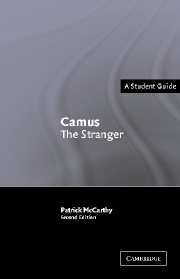2 - The Stranger
Published online by Cambridge University Press: 05 June 2012
Summary
Meursault's languages
The very first paragraph of the novel poses the issue of language:
Aujourdhui, maman est morte. Ou peut-être hier, je ne sais pas. J'ai reçu un télégramme de l'asile: ‘Mère décédée. Enterrement demain. Sentiments distingués.’ Cela ne veut rien dire. C'était peut-être hier. (Mother died today. Or perhaps yesterday, I don't know. I received a telegram from the home: ‘Your mother passed away. Funeral tomorrow. Sincerely yours.’ That doesn't mean anything. Perhaps it was yesterday.)
(9)Two different kinds of language are juxtaposed as the narrator, an unidentified ‘I’, reads a text sent by ‘the home’ which is, as we later learn, an organ of the state. The telegram employs a euphemism, ‘passed away’, and ends with a purely formal greeting. It informs the reader of the event of his mother's death while concealing the significance of that death. It is also a command which the narrator-character obeys by departing to attend the funeral.
The narrator-reader does not, however, accept the telegram's authority without criticism. It ‘doesn't mean anything’, he notes; its language is unsatisfactory. By depicting the narrator as a reader, The Stranger is indicating to us, its own readers, how we should tackle it: we should be wary of the traps and commands it contains.
As for the narrator's own language, which surrounds and besieges the telegram, it is less formal, and uses the familiar French term ‘maman’ for ‘mère’.
Information
- Type
- Chapter
- Information
- Camus: The Stranger , pp. 14 - 71Publisher: Cambridge University PressPrint publication year: 2004
